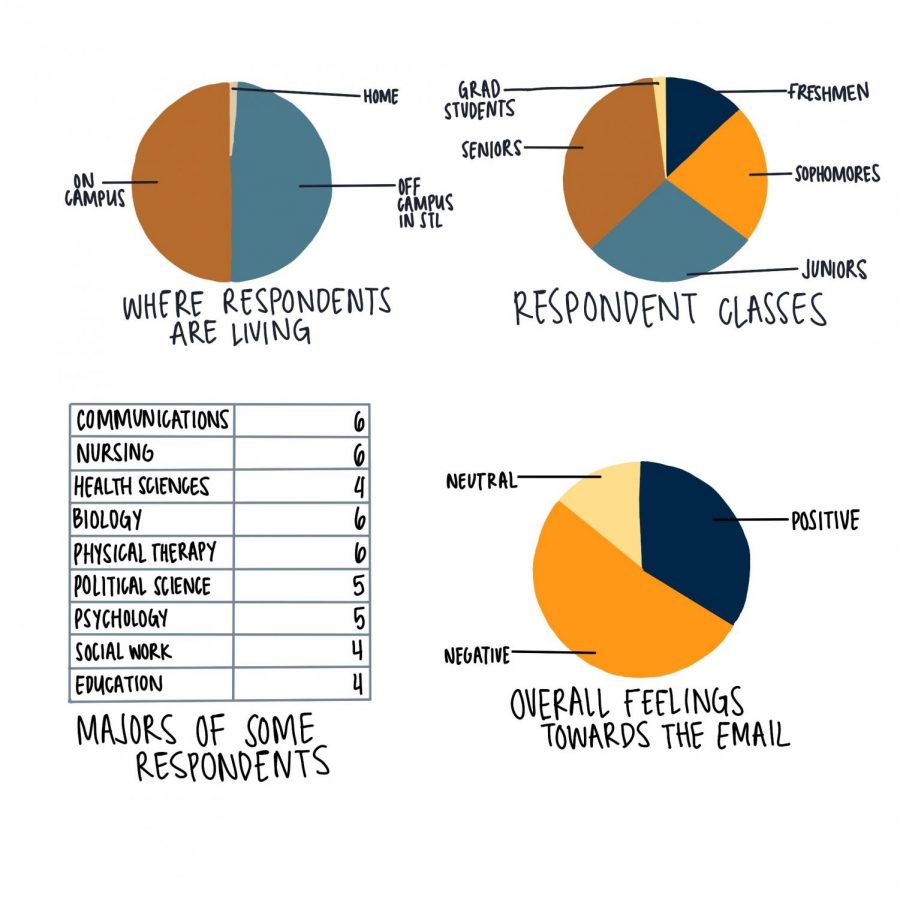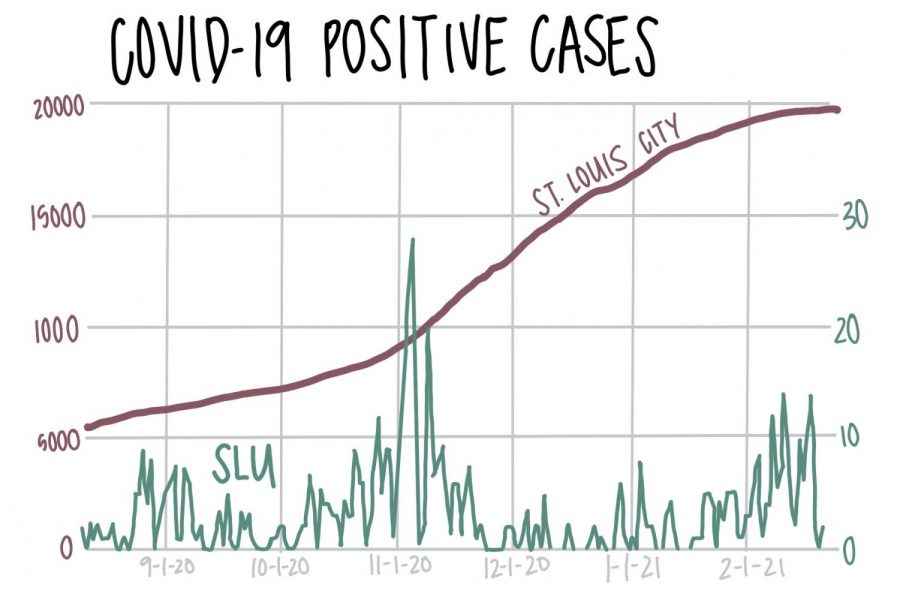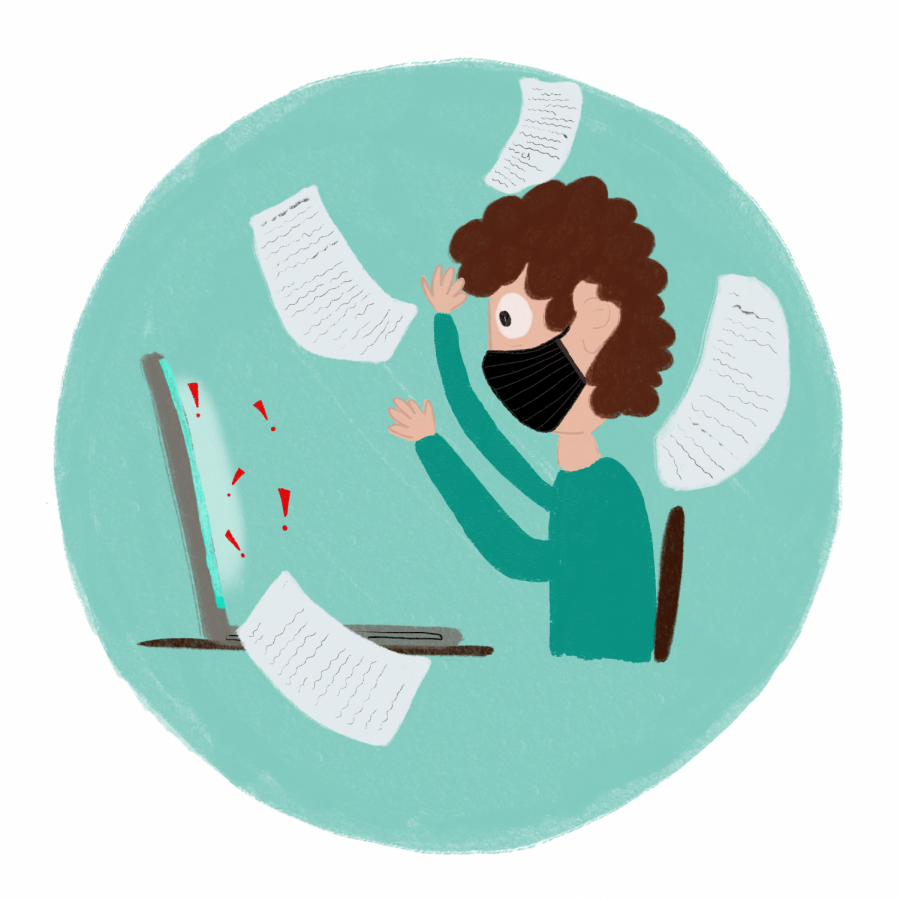Breaking Point or Turning Point: Student Reactions to the Student Development
On Tuesday Feb. 9, Saint Louis University’s Division of Student Development sent out an email to all SLU students about tightening COVID-19 restrictions. It had only been a couple of weeks since SLU students had moved back to campus after a lengthy winter break, eager to see their friends again. It was also just after the 2021 Super Bowl, when many came together to enjoy the sport of football, the various commercials, and to just simply enjoy each other’s company. However, this socialization greatly worried officials at SLU, fearing it would compromise their COVID-19 plans. SLU’s email showcased this fear, with an opening as follows:
“We’re on the brink of implementing severe COVID-19 restrictions because some students, it appears, have just given up. But you can change our minds. How? No more birthday parties. No more large gatherings in off-campus apartments. No more on-campus parties. No beer-pong parties. No Mardi Gras parties. No more hanging out after meals, without masks on, while sitting too close to one another.”
The email detailed various violations of SLU’s public health safeguards, such as 70 complaints about multiple parties, that had increased the number of on-campus positive cases of COVID-19. The email also contained a warning of the more severe restrictions SLU would implement should this behavior continue: Indefinite suspension of building-to-building visitation, suspension of all in-person non-academic events and activities, and closure of recently-opened residence hall lounges and common areas being a few of these restrictions.
Some students were so upset and hurt by the email that they responded to it. Sophomore Selena Mueller wrote a lengthy email explaining how she felt after reading the message. As she explained the lack of respect that she felt, she also went into detail about the things that the university has done wrong and could improve on. “It is not the responsibility of the student body to protect ourselves when we are living in dorms and apartments that lack the proper precautions to ensure our safety.” She further wrote, “Explain to me why every hand sanitizer dispenser in my building is broken. Explain to me why multiple staff members and food workers have refused to wear their masks correctly in the presence of students. Explain to me why SLU did not predict the correct amount of housing for positive cases.”
To learn more about the student body’s perspective on the email, The University News put out a survey to collect a diverse range of reactions and opinions. We received 100 responses and read through a myriad of perspectives.

Some students, like Mueller, were upset, while others agreed with what the email had to say. An anonymous senior wrote, “I liked that the problematic students finally got called out. If you didn’t like the email, you are most likely the problem. I’m tired of seeing people get together in large groups and hang out unmasked. I honestly feel like SLU needs to do a better job at reprimanding and punishing students. I’m not looking to have everyone get sent home again [because] a fraction of the student body is being stupid.”
Several students thought the email was a good way to get the word out about being safer on campus and thought that people were overreacting to it. “I have truthfully been deeply disappointed by the student response to the email from Dr. Lohe,” another anonymous senior said, “I think the email was very tame in comparison to what could have been said to students, as well as compared to some much more drastic measures that have been taken by our peer institutions at other Jesuit universities.”
Other students felt differently. “I felt that I was being talked down to, and blamed for the ramifications of administration decisions to bring back students in the middle of a pandemic whilst failing to sufficiently acknowledge the mental health and social concerns of students,” said one anonymous junior.
Some students felt that the email was both helpful and hurtful: “I liked that it was serious, because people need to realize that partying or hanging out in large groups without masks doesn’t only affect them, but the whole student body. However, I think SLU didn’t claim responsibility over the parts they can control.”
Overall, the majority of the students that filled out the survey mentioned that they felt like they were being talked to like “children” and that the email had been very condescending in tone. Students also felt that the email was quite “accusatory” as Dr. Lohe wrote, “Don’t spend Mardi Gras “day drinking” instead of going to class. (Yes, we’ve heard about that plan.)” and followed up with, “You asked for more mental health days in the calendar, and February 17 is the first one. Use it as it was intended, not recovering from a day of partying.” Several students said they felt that Dr. Lohe had assumed that everybody would be partying and disrupting the university’s COVID numbers.
Additionally, Mueller explained that the email “is perpetuating a culture that turns students against each other,” when discussing the new Integrity Hotline. This hotline was intended for students to anonymously report other students when there were unsafe actions involving COVID-19. For example, if someone found out that someone else had been out partying, they could report them. Several students felt that this could be problematic because students could potentially use this as a way to get people they did not like or perhaps had a problem with in trouble, rather than a tool to help the university. A particular student said, “I get that we do need to be taking things more seriously but by essentially creating a snitch hotline you are destroying trust between administration but it’s also destroying trust between students which is hard to recover once it’s gone.” The debate on whether students should report each other or not is still unclear as there are arguments both for and against it.
Debra Lohe, then interim Vice President of Student Development and author of the email, commented on the intense student response in an interview with the UNews. “I sent a very tough message on Tuesday,” shared Lohe. “You may not like that list, but that’s the next set of things we would move to if we had to, and what you can do to avoid that situation.”

However, the strong reactions towards the email speak to a much larger issue: COVID-19 fatigue. It has been almost a year since SLU first suspended normal campus life, and since mitigation strategies like wearing masks or social distancing were implemented. Even though students are now back on SLU’s campus, the guidelines that are in place, while promoting safety, also ensure an atmosphere of loneliness. Students do not have the physical interaction that they are used to with their peers and it is taking a toll on their mental wellbeing.
In a Nature.com article, there has been scientific discussion about isolation and loneliness affecting physical health. “Loneliness and social isolation worsen the burden of stress and often produce deleterious effects on mental, cardiovascular and immune health.” Along with feeling isolated, young teens, especially students, experience anxiety and depression, which has increased severely since the start of the pandemic. According to an article published by CNN, the lack of social interaction during this time of social distancing is detrimental to student development as, “Having strong bonds and strong friendships helps us get through difficult times — including times like these. For some students, isolation may feel scarier than the virus itself.”
“Socially I’m drained,” one anonymous SLU junior wrote to UNews, “I want to be able to go out and do things without the risk of COVID, I want to be able to do things with people outside of my ‘bubble,’ I don’t want to have to bring Clorox wipes and sanitizer with me everywhere.”
For many, the social experience is a big part of the college experience: in this time of self-discovery, having others to hang out with is vital. However, the opportunities to meet new people and see old friends have been severely limited. Large gatherings like parties are discouraged, public events like concerts, sporting events and club events have largely been restricted to virtual settings. As one sophomore put it, “I feel like I’m on an iceberg that has broken off the mainland, drifting apart from my friends until suddenly they’re acquaintances, and suddenly they’re strangers, and suddenly they drift out of sight, over the horizon.”For SLU officials, wanting to enforce COVID-19 safety measures is understandable. However, it is still of utmost importance to foster community amongst SLU’s students. As one anonymous junior wrote, “Continuing to shove more and more restrictions down our throats emphatically stifles our ability to flourish as human beings. This is our home. Show some compassion, SLU.”
Your donation will support the student journalists of Saint Louis University.






